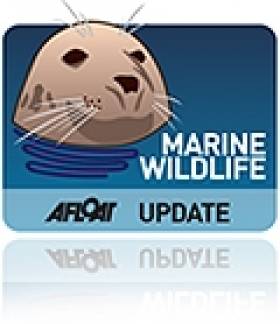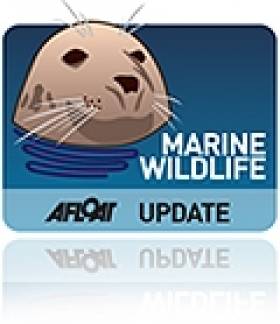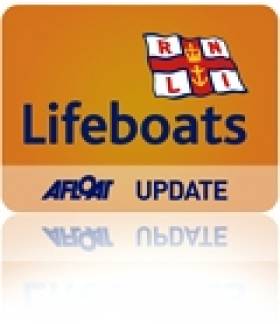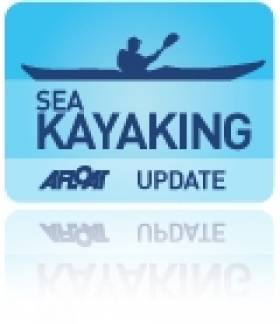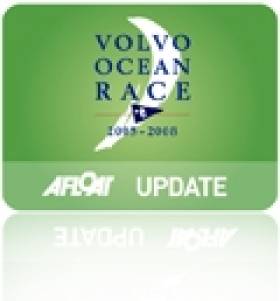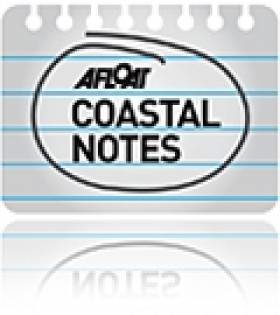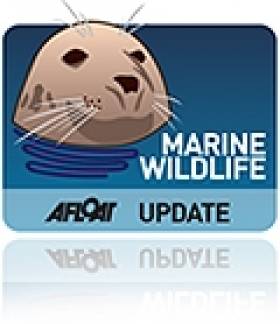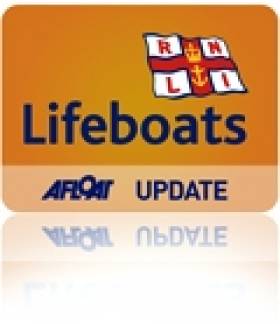Displaying items by tag: irish sea
Isle of Man Sees First Humpback Whale In 3 Years
#MarineWildlife - BBC News reports that whale watchers in the Isle of Man have spotted the first humpback whale in the waters around the island since 2010.
Tom Felce of Manx Whale and Dolphin Watch confirmed the "very rare" sighting in the Irish Sea two miles south of Castletown last week.
It's an unusual location to spot one of these ocean giants, who are a regular sight off West Cork - but even cetacean spotters there have been surprised by changes in their activity as of late.
The west coasts of Ireland and Scotland lie in the humpback's usual migratory path from the cold polar waters where it feeds in summer to subtropical climes off North Africa where it breeds in winter.
BBC News has more on the story HERE.
#MarineWildlife - Marine scientists have joined conservation groups in a chorus of opposition to the British government's apparent backtracking on plans to protect marine wildlife in the seas around the UK - including between Britain and Ireland.
As The Guardian reports, 86 academics have written to UK Environment Minister Richard Beynon, Environment Secretary Owen Paterson and Prime Minister David Cameron, urging them to rethink the neutering of proposals for Marine Protection Zones (MPZs) around the United Kingdom.
Earlier this month, as reported on Afloat.ie, environmentalists expressed disappointment over Westminster's slow progress on the issue, coming after news that just 31 of a potential 127 sites would be designated as protected.
It has since emerged that even these 31 sites so not include full protection for wildlife from destructive fishing and dredging activities.
Prof Callum Roberts of the University of York told The Guardian: "We have seen spectacular devastation in the Irish sea in the last 20 years, for example, due to scallop dredging and prawn trawling.
"As fish stocks get ever more squeezed, the use of ever more destructive gear is spreading. This is happening now and protection is long overdue."
He added: "Even if all 31 MPZs were established, it will fall far short of what is needed to recover and safeguard English seas."
The Guardian has more on the story HERE.
Douglas RNLI Brings Shannon Class To Irish Sea
#RNLI - The Irish Sea will soon have one of the most advanced lifeboats in service as Douglas RNLI in the Isle of Man has been earmarked to receive one of the new Shannon class.
The new design is 50% faster than the lifeboat it will replace, ensuring that those in need are reached even faster.
The RNLI plans to replace the Tyne class lifeboat at Douglas in 2016, which is reaching the end of its planned 25-year life span. The new lifeboat will cost £2 million (€2.32 million) and the RNLI is currently working to identify whether the funding for the new lifeboat can be raised from legacy gifts or whether fundraising activity is needed. The RNLI will announce this once the funding strategy has been identified.
The Shannon is the first modern RNLI all-weather lifeboat to operate with water jets, not propellers. Capable of 25 knots, the Shannon is 50% faster than the classes it has been designed to replace, which have a lower maximum speed of 17 knots.
The Shannon class will also improve safety for the charity’s volunteer crews, thanks to its shock absorbing seats and on-board computer system, which allows the crews to operate and monitor the lifeboat from the safety of their seats.
Michael Vlasto, RNLI operations director said of the new vessel: "I have had the privilege of being involved with the RNLI for over 38 years. In that time I have witnessed great advances in the charity’s lifeboats and seen many new vessels arrive on station. However, I have never seen our volunteer crews quite as excited as they are about the Shannon.
"This all-weather lifeboat is half as fast again as the lifeboats it has been designed to replace and using water jet propulsion, the manoeuvrability is exceptional. Most importantly though, the Shannon has been carefully developed with the safety of the volunteer crews at the very heart of the design, allowing them to shave life-saving moments off the time it takes to reach those in trouble at sea."
Some of the RNLI Douglas volunteer crew were given the opportunity to experience the Shannon first-hand with a trip around Douglas Bay last weekend as the prototype lifeboat visited the island as part of sea trials that began in January, as previously reported on Afloat.ie.
Afterwards, Douglas coxswain Neal Corran was asked for his immediate thoughts on the new lifeboat. "I was impressed with the boat’s speed and manoeuvrability and look forward to Douglas receiving theirs when it becomes available," he said.
The Shannon has been developed by the RNLI’s in-house team of naval architects, marine engineers and operators - including Irish naval architect Peter Eyre – to replace the majority of Mersey and some remaining Tyne class lifeboats as they reach the end of their operational life (subject to the RNLI’s five-year rolling review of lifesaving assets).
Once the Shannon is rolled out across the UK and Ireland, this class of lifeboat will make up a third of the RNLI all-weather lifeboat fleet, at which point the RNLI will have reached its aim of a 25 knot all-weather lifeboat fleet.
The majority of the 50-plus Shannon class lifeboats to be stationed throughout the UK and Ireland will be built at the RNLI’s new all-weather Lifeboat Centre in Poole, which is currently under construction. Bringing all-weather lifeboat production in-house will save the charity £3.7m annually – the equivalent of 2.5 Shannon class lifeboats.
Top NI Surf Kayaker Set To Cross Irish Sea
#SeaKayaking - A Portrush teen is preparing to cross the Irish Sea by kayak for charity this summer.
Top surf kayaker Andy McClelland aims to raise funds for the Alzheimer's Society, Kidney Research and the Regional Respiratory Centre with his One Man One Boat campaign, which will see him kayak 22 miles across the open water from Donaghadee in Co Down to Portpatrick in Scotland.
The current Surf Kayak Junior World Champion will embark on his challenge in a high-performance sea kayak on loan from Rockpool Sea Kayaks and is presently planning his trip with fellow physiotherapy students at Ulster University Jordanstown as well as the Causeway Coast Kayaking Club.
McClelland has yet to set a date for the solo crossing, awaiting word on the best possible weather and sea conditions in May.
The Alzheimer's Society has more on the story HERE.
Cardiff Will Host Volvo Ocean Race in 2017-18
#VOR - The Volvo Ocean Race will come to the Irish Sea for its 13th edition as Cardiff has been announced as a host port for the 2017-18 race.
It will be the first time the UK has hosted the round-the-world yachting challenge since the 2005-06 edition, and the first time ever that Wales has welcomed the race.
"Cardiff made a particularly impressive bid to win one of the coveted European slots and with such outstanding facilities and great enthusiasm I'm convinced that we will have a stopover to remember," said VOR COO Tom Touber at the announcement in Cardiff Bay.
"The fact that we are making this announcement five years in advance is a very strong signal about the future of the race and the commitment to it from the Volvo companies."
Cardiff Council Leader Cllr Heather Joyce said the event "will bring hundreds of thousands of visitors to the city, and be hugely beneficial to the local economy."
She added: “Being awarded the successful bid for one of the most important sailing events in the world once again demonstrates Cardiff’s ability to deliver major international sporting events on the world stage.
"It proves our reputation as an event city as well as providing an opportunity for many non sailors to try the sport through a co-ordinated programme of sailing activities before, during and following the event.”
The good news for Cardiff comes just says after Lisbon was announced as the latest host port for the 2014-15 edition of the Volvo Ocean Race. Ireland will sadly have no host port in the next running of the VOR despite the success of Galway's race finale last summer.
New Irish Sea Observation Tower Opens In UK
#IrishSea - A new observation tower on the Lancashire coastline with views over the Irish Sea has opened a year after construction began.
BBC News reports that the Rossall Point Observation Tower, which reaches a height of 14 metres (46ft), will act as a base for the UK's National Coastwatch Institution.
As reported last year on Afloat.ie, a viewing platform at the top will be open to the public providing ample vistas of the Irish Sea's marine wildlife for birdwatchers and more.
The view from the top will also be projected on a screen in the education centre to be located in the tower's ground floor for those whose mobility prevents them from accessing the top level.
Body Recovered From Irish Sea Could Be Missing Rush Man
#Missing - A body recovered from the sea off north Co Dublin yesterday may be that of a man who went missing from Rush at Christmas.
The Irish Independent reports that a post-mortem is being carried out on the body to confirm if it is that of 24-year-old Paul Byrne, who was last seen in the early hours of Christmas Day.
Fishermen in the Irish Sea made the grim discovery in their nets yesterday and brought the body to Skerries harbour after 8pm.
The Irish Independent has more on the story HERE.
Met Éireann Issues 'Yellow' Alert As Strong Gales Sweep Coast
#Weather - Met Éireann has issued a 'yellow' weather alert for coastal areas around Ireland today (4 February) as winds are expected to reach speeds of up to 110km/h.
Westerly winds will continue to reach gale force or strong gale force this evening and tonight on all Irish coastal waters and on the Irish Sea.
Severe gusts of 90 to 110 km/h are predicted for Connacht, Donegal and in coastal areas of Munster. Elsewhere winds will gust between 80 and 90 km/hr.
After dark, showers will become increasingly wintry with the possibility of snow and even blizzard-like conditions, especially in the north and west on high ground.
But meteorologists say that any lying snow will melt during the course of tomorrow morning and afternoon as temperatures rise.
Researchers Film Dolphin 'Superpod' In Irish Sea
#MarineWildlife - BBC News has some incredible footage of a 'superpod' comprising hundreds of dolphins in the Irish Sea captured this week.
The video was shot by surprised researchers with the Wales-based Sea Trust on one of the groups routine survey expeditions between Fishguard and Rosslare on board the Stena Europe ferry.
Cliff Benson of the marine wildlife charity described the sea as "boiling" with dolphins just 10 miles off the Irish coast yesterday morning.
"They were just coming and coming. It was the last thing on earth I was expecting in the winter," he said. "We had at least 250 and that's a conservative estimate. I'm guessing there was as many as 500."
The incredible sight comes just a month after the researchers recorded what they called a "dolphin-fest" along the same route west of Tusker Rock, numbering more than a 100 dolphins and 26 porpoises.
BBC News has more on the story HERE - and more footage is available HERE via RTÉ News.
Sea Trials Won't Weather New Shannon Class Lifeboat
#Lifeboats - The video above shows off a prototype of the RNLI's new lifeboat class, the Shannon, as it undergoes sea trials to determine how it handles the rough weather all too common to the seas around the UK and Ireland.
As previously reported on Afloat.ie, Irish naval architect Peter Eyre has been instrumental in the new lifeboat design, which is nearly 50% faster than the vessels currently in service.
It's also the second RNLI boat to be designed by an Irishman, after the Atlantic 21 developed in the 1970s by Cork-born Rear Admiral Desmond Hoare at the Atlantic College in Wales.
In other RNLI news, tributes were paid in the Isle of Man this week to the founder of the lifeboat institution in an annual ceremony on the Irish Sea island.
As BBC News reports, Sir William Hillary launched an appeal in 1824 that let to the formation of the RNLI, and he went on to serve as a member of the lifeboat crew at Douglas.


























